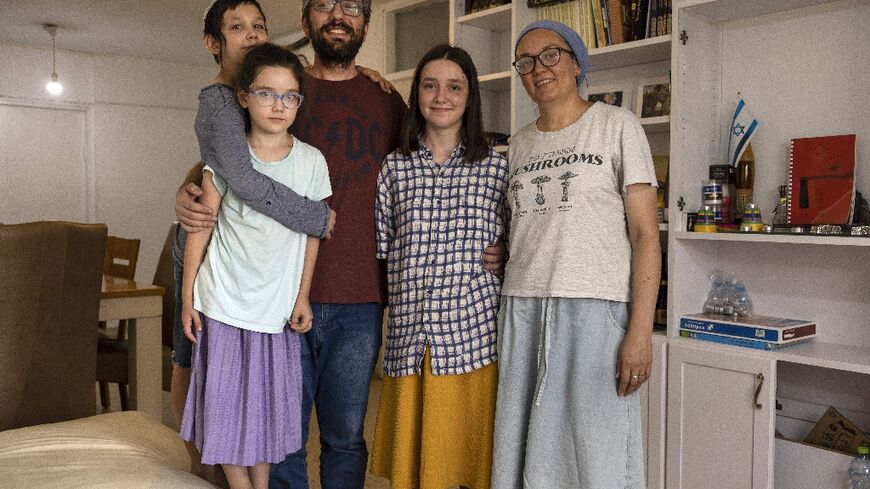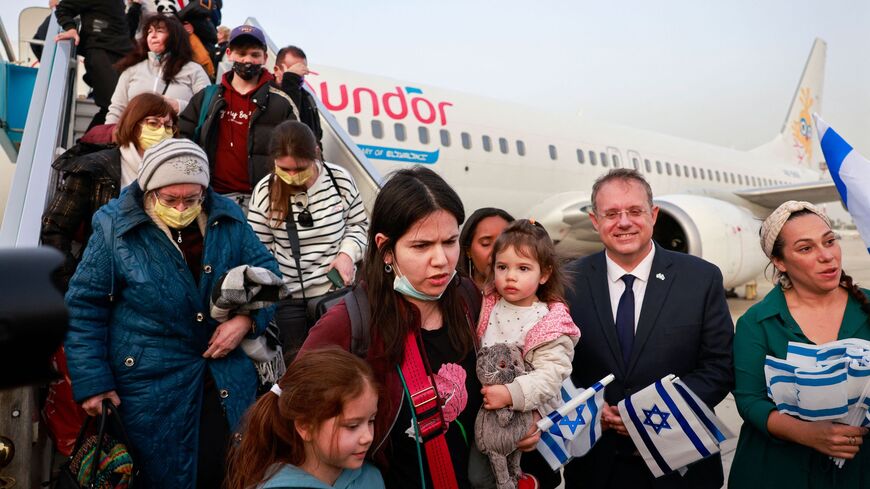Israeli town welcomes fleeing Ukrainian Jews

In a parking lot under his office in northern Israel, Nof Hagalil mayor Ronen Plot juggled phone calls as volunteers unloaded blankets and clothes donated for refugees fleeing war in Ukraine.
"Nof Hagalil is built on immigration," said Plot, 67, who arrived in Israel nearly 50 years ago from Moldova. "We will absorb as many people as we can."
After the Russian invasion began, Plot posted on Facebook, inviting Ukrainian "olim", or Jewish immigrants, to his town and urging residents to help.
"If a big immigration wave arrives, we'd be happy to take part in the Israeli effort," he wrote.
Under Israel's "law of return", anyone with at least one Jewish parent or grandparent is entitled to citizenship.
Among those responding to Plot's invitation was Chaim Gershman, who reached Nof Hagalil on Thursday with his wife Ora and their four children. His mother Nelja, 60, arrived a day later.
Gershman said he had just one hour to pack, as Russian bombs fell on his community near Kyiv. He left wearing work clothes from fixing a faucet.
"At first, we didn't believe a thing like this will happen and we thought it was fake," said Gershman.
He said when he arrived in Israel, he chose Nof Hagalil because of the mayor's posts.
Plot said his community offers a familiar environment because over half its 50,000 residents speak Russian.
Shops sell Belarusian herring and Georgian sparkling water, and street signs are translated into Russian.
The mayor said he located 600 empty hotel rooms and 300 vacant apartments to house the "exhausted" Ukrainians.
"They endured a lot of misery, they are hungry and tired and it's awful."
- 'We left everything' -
The Gershmans fled the Kyiv-area town of Anatevka, built in the image of the fictional Jewish village made famous in the musical "Fiddler on the Roof".
Escorted by police, the family drove 17 hours to reach the Moldovan border, stopping once for 10 minutes amid explosions.
"We left everything we had, our whole lives," Ora Gershman, 35, said.
Now, the seven family members sleep in two rooms in Nof Hagalil's Plaza Hotel. The children have enrolled in school, while the parents organise paperwork and search for permanent accommodation.
Israeli Prime Minister Naftali Bennett has avoided forceful condemnation of Russia's invasion, stressing Israel's strong ties with Moscow and Kyiv.
Chaim Gershman said he did not "understand how one can stay neutral when it is clear who the aggressor is".
"Putin has said they will only attack military targets but at the moment they are bombing without distinction," he said.
- 'Impossible' rate -
Authorities say as many as 100,000 "olim" and their families could arrive from Ukraine and Russia, evoking an earlier wave of about a million people who immigrated from the collapsing former Soviet Union.
Interior minister Ayelet Shaked estimated Sunday that about 15,000 Ukrainians could reach Israel by the end of March, with 90 percent unqualified for "return" rights. She said that was an "impossible" rate for the country of 9.4 million people.
On Tuesday, the government scrapped a requirement that Israeli citizens hosting non-Jewish Ukrainians who are not immediate relatives post a refundable 10,000 shekel ($3,046) deposit per traveller.
Shaked said Israel would accept a total of 5,000 Ukrainian refugees with no "return" rights and not deport 20,000 Ukrainians who entered Israel, mostly illegally, before the fighting.
She said Israel would remain a refuge for anyone with verifiable Jewish lineage fleeing the conflict, echoing earlier comments from Bennett.
"The state of Israel is a haven for Jews who are in distress, that is our mission," the premier said Monday. "We will complete that sacred mission this time, too."
- Arab neighbours -
The arrival of Jews to Nof Hagalil touches a historical nerve.
It was built as a Jewish town in the 1950s on land appropriated from the neighbouring Arab city of Nazareth.
Israel's founding prime minister David Ben Gurion aimed to "Judaize" the Galilee, which was inhabited mostly by Israel's 20 percent Arab minority.
Arab citizens of Israel are the descendants of Palestinians who remained during Israel's 1948 war of independence, while more than 700,000 others fled or were forced from their homes. Israel has not allowed most Palestinian refugees to return.
With time, Arab citizens have moved into Nof Hagalil, and today they comprise about a quarter of its population.
One of them is Saed Diab, 39, the banquet manager of the Plaza Hotel that is hosting refugees. He said he donated hand-me-down clothing for the new arrivals.
"I was in Kyiv on holiday just before the coronavirus. Nice city, good people," he said.
"I'm sorry for what's happening to them."











